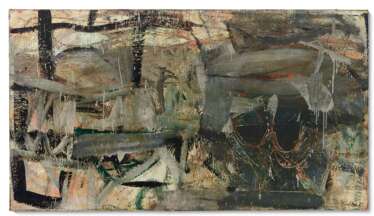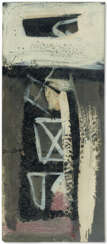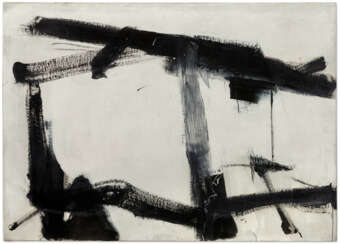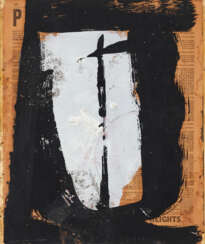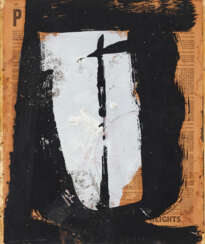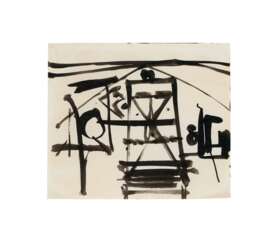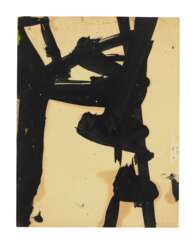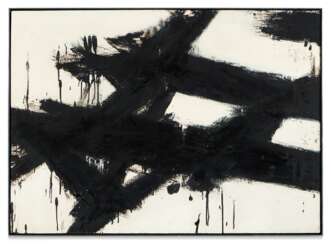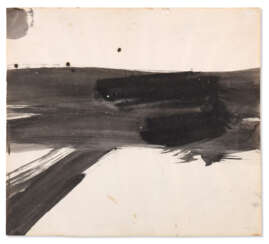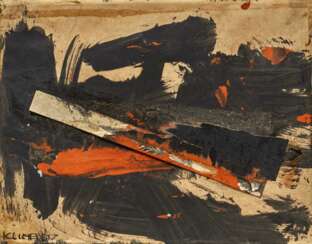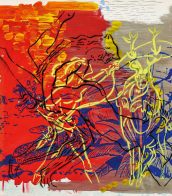franz kline (1910 - 1962)
Franz Kline, an American painter, emerged as a pivotal figure in the post-World War II art scene, where his dynamic black and white abstract paintings redefined the boundaries of abstract expressionism. Born in 1910, Kline's unique approach to painting, characterized by bold, gestural brushstrokes and a stark monochromatic palette, positioned him as a key contributor to the development of Abstract Expressionism, a movement that celebrated spontaneity, powerful expressions of emotion, and individuality in art. His work is not merely an exploration of form and space but a dramatic interaction of light and shadow, evoking intense emotional responses from viewers.
Kline's artistry is distinguished by its focus on the contrast between black and white, using abstract forms to create a sense of dynamic motion and energy. This distinctive style stemmed from his initial experiments with brushstrokes, which evolved from figurative sketches to monumental, abstract compositions. His paintings, such as "Chief" (1950) and "Mahoning" (1956), showcase this dramatic scale and abstract expressionism, making them iconic pieces of American art. These works are celebrated in major museums and galleries worldwide, highlighting Kline's contribution to modern art.
Kline's influence extends beyond his immediate impact on Abstract Expressionism, shaping the trajectory of modern art with his innovative techniques and philosophical approach to painting. His legacy is preserved in the collections of prestigious institutions such as The Museum of Modern Art in New York and the Tate Gallery in London, where his works continue to inspire art lovers, collectors, and experts in the fields of art and antiques. For those passionate about exploring the depths of abstract expressionism and the pioneering artists behind its rise, Franz Kline's work offers a captivating journey into the essence of emotional expression through art.
To stay informed about upcoming sales, auctions, and events related to the remarkable work of Franz Kline, we invite you to sign up for our updates. This subscription is an exclusive opportunity for collectors and art experts to access the latest on available pieces and notable auction events. Join our community to ensure you never miss an opportunity to engage with the legacy of Franz Kline.
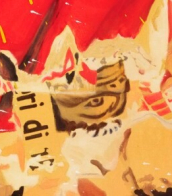
Franz Kline, an American painter, emerged as a pivotal figure in the post-World War II art scene, where his dynamic black and white abstract paintings redefined the boundaries of abstract expressionism. Born in 1910, Kline's unique approach to painting, characterized by bold, gestural brushstrokes and a stark monochromatic palette, positioned him as a key contributor to the development of Abstract Expressionism, a movement that celebrated spontaneity, powerful expressions of emotion, and individuality in art. His work is not merely an exploration of form and space but a dramatic interaction of light and shadow, evoking intense emotional responses from viewers.
Kline's artistry is distinguished by its focus on the contrast between black and white, using abstract forms to create a sense of dynamic motion and energy. This distinctive style stemmed from his initial experiments with brushstrokes, which evolved from figurative sketches to monumental, abstract compositions. His paintings, such as "Chief" (1950) and "Mahoning" (1956), showcase this dramatic scale and abstract expressionism, making them iconic pieces of American art. These works are celebrated in major museums and galleries worldwide, highlighting Kline's contribution to modern art.
Kline's influence extends beyond his immediate impact on Abstract Expressionism, shaping the trajectory of modern art with his innovative techniques and philosophical approach to painting. His legacy is preserved in the collections of prestigious institutions such as The Museum of Modern Art in New York and the Tate Gallery in London, where his works continue to inspire art lovers, collectors, and experts in the fields of art and antiques. For those passionate about exploring the depths of abstract expressionism and the pioneering artists behind its rise, Franz Kline's work offers a captivating journey into the essence of emotional expression through art.
To stay informed about upcoming sales, auctions, and events related to the remarkable work of Franz Kline, we invite you to sign up for our updates. This subscription is an exclusive opportunity for collectors and art experts to access the latest on available pieces and notable auction events. Join our community to ensure you never miss an opportunity to engage with the legacy of Franz Kline.
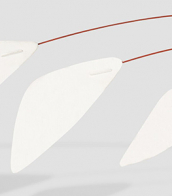
Franz Kline, an American painter, emerged as a pivotal figure in the post-World War II art scene, where his dynamic black and white abstract paintings redefined the boundaries of abstract expressionism. Born in 1910, Kline's unique approach to painting, characterized by bold, gestural brushstrokes and a stark monochromatic palette, positioned him as a key contributor to the development of Abstract Expressionism, a movement that celebrated spontaneity, powerful expressions of emotion, and individuality in art. His work is not merely an exploration of form and space but a dramatic interaction of light and shadow, evoking intense emotional responses from viewers.
Kline's artistry is distinguished by its focus on the contrast between black and white, using abstract forms to create a sense of dynamic motion and energy. This distinctive style stemmed from his initial experiments with brushstrokes, which evolved from figurative sketches to monumental, abstract compositions. His paintings, such as "Chief" (1950) and "Mahoning" (1956), showcase this dramatic scale and abstract expressionism, making them iconic pieces of American art. These works are celebrated in major museums and galleries worldwide, highlighting Kline's contribution to modern art.
Kline's influence extends beyond his immediate impact on Abstract Expressionism, shaping the trajectory of modern art with his innovative techniques and philosophical approach to painting. His legacy is preserved in the collections of prestigious institutions such as The Museum of Modern Art in New York and the Tate Gallery in London, where his works continue to inspire art lovers, collectors, and experts in the fields of art and antiques. For those passionate about exploring the depths of abstract expressionism and the pioneering artists behind its rise, Franz Kline's work offers a captivating journey into the essence of emotional expression through art.
To stay informed about upcoming sales, auctions, and events related to the remarkable work of Franz Kline, we invite you to sign up for our updates. This subscription is an exclusive opportunity for collectors and art experts to access the latest on available pieces and notable auction events. Join our community to ensure you never miss an opportunity to engage with the legacy of Franz Kline.

Franz Kline, an American painter, emerged as a pivotal figure in the post-World War II art scene, where his dynamic black and white abstract paintings redefined the boundaries of abstract expressionism. Born in 1910, Kline's unique approach to painting, characterized by bold, gestural brushstrokes and a stark monochromatic palette, positioned him as a key contributor to the development of Abstract Expressionism, a movement that celebrated spontaneity, powerful expressions of emotion, and individuality in art. His work is not merely an exploration of form and space but a dramatic interaction of light and shadow, evoking intense emotional responses from viewers.
Kline's artistry is distinguished by its focus on the contrast between black and white, using abstract forms to create a sense of dynamic motion and energy. This distinctive style stemmed from his initial experiments with brushstrokes, which evolved from figurative sketches to monumental, abstract compositions. His paintings, such as "Chief" (1950) and "Mahoning" (1956), showcase this dramatic scale and abstract expressionism, making them iconic pieces of American art. These works are celebrated in major museums and galleries worldwide, highlighting Kline's contribution to modern art.
Kline's influence extends beyond his immediate impact on Abstract Expressionism, shaping the trajectory of modern art with his innovative techniques and philosophical approach to painting. His legacy is preserved in the collections of prestigious institutions such as The Museum of Modern Art in New York and the Tate Gallery in London, where his works continue to inspire art lovers, collectors, and experts in the fields of art and antiques. For those passionate about exploring the depths of abstract expressionism and the pioneering artists behind its rise, Franz Kline's work offers a captivating journey into the essence of emotional expression through art.
To stay informed about upcoming sales, auctions, and events related to the remarkable work of Franz Kline, we invite you to sign up for our updates. This subscription is an exclusive opportunity for collectors and art experts to access the latest on available pieces and notable auction events. Join our community to ensure you never miss an opportunity to engage with the legacy of Franz Kline.
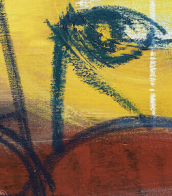
Franz Kline, an American painter, emerged as a pivotal figure in the post-World War II art scene, where his dynamic black and white abstract paintings redefined the boundaries of abstract expressionism. Born in 1910, Kline's unique approach to painting, characterized by bold, gestural brushstrokes and a stark monochromatic palette, positioned him as a key contributor to the development of Abstract Expressionism, a movement that celebrated spontaneity, powerful expressions of emotion, and individuality in art. His work is not merely an exploration of form and space but a dramatic interaction of light and shadow, evoking intense emotional responses from viewers.
Kline's artistry is distinguished by its focus on the contrast between black and white, using abstract forms to create a sense of dynamic motion and energy. This distinctive style stemmed from his initial experiments with brushstrokes, which evolved from figurative sketches to monumental, abstract compositions. His paintings, such as "Chief" (1950) and "Mahoning" (1956), showcase this dramatic scale and abstract expressionism, making them iconic pieces of American art. These works are celebrated in major museums and galleries worldwide, highlighting Kline's contribution to modern art.
Kline's influence extends beyond his immediate impact on Abstract Expressionism, shaping the trajectory of modern art with his innovative techniques and philosophical approach to painting. His legacy is preserved in the collections of prestigious institutions such as The Museum of Modern Art in New York and the Tate Gallery in London, where his works continue to inspire art lovers, collectors, and experts in the fields of art and antiques. For those passionate about exploring the depths of abstract expressionism and the pioneering artists behind its rise, Franz Kline's work offers a captivating journey into the essence of emotional expression through art.
To stay informed about upcoming sales, auctions, and events related to the remarkable work of Franz Kline, we invite you to sign up for our updates. This subscription is an exclusive opportunity for collectors and art experts to access the latest on available pieces and notable auction events. Join our community to ensure you never miss an opportunity to engage with the legacy of Franz Kline.
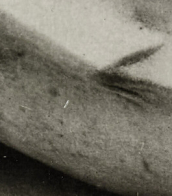
Franz Kline, an American painter, emerged as a pivotal figure in the post-World War II art scene, where his dynamic black and white abstract paintings redefined the boundaries of abstract expressionism. Born in 1910, Kline's unique approach to painting, characterized by bold, gestural brushstrokes and a stark monochromatic palette, positioned him as a key contributor to the development of Abstract Expressionism, a movement that celebrated spontaneity, powerful expressions of emotion, and individuality in art. His work is not merely an exploration of form and space but a dramatic interaction of light and shadow, evoking intense emotional responses from viewers.
Kline's artistry is distinguished by its focus on the contrast between black and white, using abstract forms to create a sense of dynamic motion and energy. This distinctive style stemmed from his initial experiments with brushstrokes, which evolved from figurative sketches to monumental, abstract compositions. His paintings, such as "Chief" (1950) and "Mahoning" (1956), showcase this dramatic scale and abstract expressionism, making them iconic pieces of American art. These works are celebrated in major museums and galleries worldwide, highlighting Kline's contribution to modern art.
Kline's influence extends beyond his immediate impact on Abstract Expressionism, shaping the trajectory of modern art with his innovative techniques and philosophical approach to painting. His legacy is preserved in the collections of prestigious institutions such as The Museum of Modern Art in New York and the Tate Gallery in London, where his works continue to inspire art lovers, collectors, and experts in the fields of art and antiques. For those passionate about exploring the depths of abstract expressionism and the pioneering artists behind its rise, Franz Kline's work offers a captivating journey into the essence of emotional expression through art.
To stay informed about upcoming sales, auctions, and events related to the remarkable work of Franz Kline, we invite you to sign up for our updates. This subscription is an exclusive opportunity for collectors and art experts to access the latest on available pieces and notable auction events. Join our community to ensure you never miss an opportunity to engage with the legacy of Franz Kline.

Franz Kline, an American painter, emerged as a pivotal figure in the post-World War II art scene, where his dynamic black and white abstract paintings redefined the boundaries of abstract expressionism. Born in 1910, Kline's unique approach to painting, characterized by bold, gestural brushstrokes and a stark monochromatic palette, positioned him as a key contributor to the development of Abstract Expressionism, a movement that celebrated spontaneity, powerful expressions of emotion, and individuality in art. His work is not merely an exploration of form and space but a dramatic interaction of light and shadow, evoking intense emotional responses from viewers.
Kline's artistry is distinguished by its focus on the contrast between black and white, using abstract forms to create a sense of dynamic motion and energy. This distinctive style stemmed from his initial experiments with brushstrokes, which evolved from figurative sketches to monumental, abstract compositions. His paintings, such as "Chief" (1950) and "Mahoning" (1956), showcase this dramatic scale and abstract expressionism, making them iconic pieces of American art. These works are celebrated in major museums and galleries worldwide, highlighting Kline's contribution to modern art.
Kline's influence extends beyond his immediate impact on Abstract Expressionism, shaping the trajectory of modern art with his innovative techniques and philosophical approach to painting. His legacy is preserved in the collections of prestigious institutions such as The Museum of Modern Art in New York and the Tate Gallery in London, where his works continue to inspire art lovers, collectors, and experts in the fields of art and antiques. For those passionate about exploring the depths of abstract expressionism and the pioneering artists behind its rise, Franz Kline's work offers a captivating journey into the essence of emotional expression through art.
To stay informed about upcoming sales, auctions, and events related to the remarkable work of Franz Kline, we invite you to sign up for our updates. This subscription is an exclusive opportunity for collectors and art experts to access the latest on available pieces and notable auction events. Join our community to ensure you never miss an opportunity to engage with the legacy of Franz Kline.
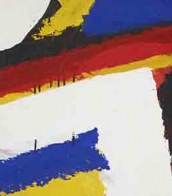
Franz Kline, an American painter, emerged as a pivotal figure in the post-World War II art scene, where his dynamic black and white abstract paintings redefined the boundaries of abstract expressionism. Born in 1910, Kline's unique approach to painting, characterized by bold, gestural brushstrokes and a stark monochromatic palette, positioned him as a key contributor to the development of Abstract Expressionism, a movement that celebrated spontaneity, powerful expressions of emotion, and individuality in art. His work is not merely an exploration of form and space but a dramatic interaction of light and shadow, evoking intense emotional responses from viewers.
Kline's artistry is distinguished by its focus on the contrast between black and white, using abstract forms to create a sense of dynamic motion and energy. This distinctive style stemmed from his initial experiments with brushstrokes, which evolved from figurative sketches to monumental, abstract compositions. His paintings, such as "Chief" (1950) and "Mahoning" (1956), showcase this dramatic scale and abstract expressionism, making them iconic pieces of American art. These works are celebrated in major museums and galleries worldwide, highlighting Kline's contribution to modern art.
Kline's influence extends beyond his immediate impact on Abstract Expressionism, shaping the trajectory of modern art with his innovative techniques and philosophical approach to painting. His legacy is preserved in the collections of prestigious institutions such as The Museum of Modern Art in New York and the Tate Gallery in London, where his works continue to inspire art lovers, collectors, and experts in the fields of art and antiques. For those passionate about exploring the depths of abstract expressionism and the pioneering artists behind its rise, Franz Kline's work offers a captivating journey into the essence of emotional expression through art.
To stay informed about upcoming sales, auctions, and events related to the remarkable work of Franz Kline, we invite you to sign up for our updates. This subscription is an exclusive opportunity for collectors and art experts to access the latest on available pieces and notable auction events. Join our community to ensure you never miss an opportunity to engage with the legacy of Franz Kline.

Franz Kline, an American painter, emerged as a pivotal figure in the post-World War II art scene, where his dynamic black and white abstract paintings redefined the boundaries of abstract expressionism. Born in 1910, Kline's unique approach to painting, characterized by bold, gestural brushstrokes and a stark monochromatic palette, positioned him as a key contributor to the development of Abstract Expressionism, a movement that celebrated spontaneity, powerful expressions of emotion, and individuality in art. His work is not merely an exploration of form and space but a dramatic interaction of light and shadow, evoking intense emotional responses from viewers.
Kline's artistry is distinguished by its focus on the contrast between black and white, using abstract forms to create a sense of dynamic motion and energy. This distinctive style stemmed from his initial experiments with brushstrokes, which evolved from figurative sketches to monumental, abstract compositions. His paintings, such as "Chief" (1950) and "Mahoning" (1956), showcase this dramatic scale and abstract expressionism, making them iconic pieces of American art. These works are celebrated in major museums and galleries worldwide, highlighting Kline's contribution to modern art.
Kline's influence extends beyond his immediate impact on Abstract Expressionism, shaping the trajectory of modern art with his innovative techniques and philosophical approach to painting. His legacy is preserved in the collections of prestigious institutions such as The Museum of Modern Art in New York and the Tate Gallery in London, where his works continue to inspire art lovers, collectors, and experts in the fields of art and antiques. For those passionate about exploring the depths of abstract expressionism and the pioneering artists behind its rise, Franz Kline's work offers a captivating journey into the essence of emotional expression through art.
To stay informed about upcoming sales, auctions, and events related to the remarkable work of Franz Kline, we invite you to sign up for our updates. This subscription is an exclusive opportunity for collectors and art experts to access the latest on available pieces and notable auction events. Join our community to ensure you never miss an opportunity to engage with the legacy of Franz Kline.
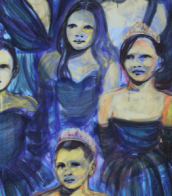
Franz Kline, an American painter, emerged as a pivotal figure in the post-World War II art scene, where his dynamic black and white abstract paintings redefined the boundaries of abstract expressionism. Born in 1910, Kline's unique approach to painting, characterized by bold, gestural brushstrokes and a stark monochromatic palette, positioned him as a key contributor to the development of Abstract Expressionism, a movement that celebrated spontaneity, powerful expressions of emotion, and individuality in art. His work is not merely an exploration of form and space but a dramatic interaction of light and shadow, evoking intense emotional responses from viewers.
Kline's artistry is distinguished by its focus on the contrast between black and white, using abstract forms to create a sense of dynamic motion and energy. This distinctive style stemmed from his initial experiments with brushstrokes, which evolved from figurative sketches to monumental, abstract compositions. His paintings, such as "Chief" (1950) and "Mahoning" (1956), showcase this dramatic scale and abstract expressionism, making them iconic pieces of American art. These works are celebrated in major museums and galleries worldwide, highlighting Kline's contribution to modern art.
Kline's influence extends beyond his immediate impact on Abstract Expressionism, shaping the trajectory of modern art with his innovative techniques and philosophical approach to painting. His legacy is preserved in the collections of prestigious institutions such as The Museum of Modern Art in New York and the Tate Gallery in London, where his works continue to inspire art lovers, collectors, and experts in the fields of art and antiques. For those passionate about exploring the depths of abstract expressionism and the pioneering artists behind its rise, Franz Kline's work offers a captivating journey into the essence of emotional expression through art.
To stay informed about upcoming sales, auctions, and events related to the remarkable work of Franz Kline, we invite you to sign up for our updates. This subscription is an exclusive opportunity for collectors and art experts to access the latest on available pieces and notable auction events. Join our community to ensure you never miss an opportunity to engage with the legacy of Franz Kline.

Franz Kline, an American painter, emerged as a pivotal figure in the post-World War II art scene, where his dynamic black and white abstract paintings redefined the boundaries of abstract expressionism. Born in 1910, Kline's unique approach to painting, characterized by bold, gestural brushstrokes and a stark monochromatic palette, positioned him as a key contributor to the development of Abstract Expressionism, a movement that celebrated spontaneity, powerful expressions of emotion, and individuality in art. His work is not merely an exploration of form and space but a dramatic interaction of light and shadow, evoking intense emotional responses from viewers.
Kline's artistry is distinguished by its focus on the contrast between black and white, using abstract forms to create a sense of dynamic motion and energy. This distinctive style stemmed from his initial experiments with brushstrokes, which evolved from figurative sketches to monumental, abstract compositions. His paintings, such as "Chief" (1950) and "Mahoning" (1956), showcase this dramatic scale and abstract expressionism, making them iconic pieces of American art. These works are celebrated in major museums and galleries worldwide, highlighting Kline's contribution to modern art.
Kline's influence extends beyond his immediate impact on Abstract Expressionism, shaping the trajectory of modern art with his innovative techniques and philosophical approach to painting. His legacy is preserved in the collections of prestigious institutions such as The Museum of Modern Art in New York and the Tate Gallery in London, where his works continue to inspire art lovers, collectors, and experts in the fields of art and antiques. For those passionate about exploring the depths of abstract expressionism and the pioneering artists behind its rise, Franz Kline's work offers a captivating journey into the essence of emotional expression through art.
To stay informed about upcoming sales, auctions, and events related to the remarkable work of Franz Kline, we invite you to sign up for our updates. This subscription is an exclusive opportunity for collectors and art experts to access the latest on available pieces and notable auction events. Join our community to ensure you never miss an opportunity to engage with the legacy of Franz Kline.
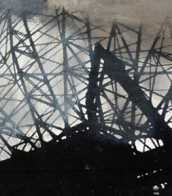
Franz Kline, an American painter, emerged as a pivotal figure in the post-World War II art scene, where his dynamic black and white abstract paintings redefined the boundaries of abstract expressionism. Born in 1910, Kline's unique approach to painting, characterized by bold, gestural brushstrokes and a stark monochromatic palette, positioned him as a key contributor to the development of Abstract Expressionism, a movement that celebrated spontaneity, powerful expressions of emotion, and individuality in art. His work is not merely an exploration of form and space but a dramatic interaction of light and shadow, evoking intense emotional responses from viewers.
Kline's artistry is distinguished by its focus on the contrast between black and white, using abstract forms to create a sense of dynamic motion and energy. This distinctive style stemmed from his initial experiments with brushstrokes, which evolved from figurative sketches to monumental, abstract compositions. His paintings, such as "Chief" (1950) and "Mahoning" (1956), showcase this dramatic scale and abstract expressionism, making them iconic pieces of American art. These works are celebrated in major museums and galleries worldwide, highlighting Kline's contribution to modern art.
Kline's influence extends beyond his immediate impact on Abstract Expressionism, shaping the trajectory of modern art with his innovative techniques and philosophical approach to painting. His legacy is preserved in the collections of prestigious institutions such as The Museum of Modern Art in New York and the Tate Gallery in London, where his works continue to inspire art lovers, collectors, and experts in the fields of art and antiques. For those passionate about exploring the depths of abstract expressionism and the pioneering artists behind its rise, Franz Kline's work offers a captivating journey into the essence of emotional expression through art.
To stay informed about upcoming sales, auctions, and events related to the remarkable work of Franz Kline, we invite you to sign up for our updates. This subscription is an exclusive opportunity for collectors and art experts to access the latest on available pieces and notable auction events. Join our community to ensure you never miss an opportunity to engage with the legacy of Franz Kline.
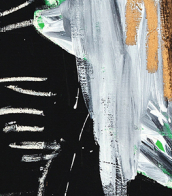
Franz Kline, an American painter, emerged as a pivotal figure in the post-World War II art scene, where his dynamic black and white abstract paintings redefined the boundaries of abstract expressionism. Born in 1910, Kline's unique approach to painting, characterized by bold, gestural brushstrokes and a stark monochromatic palette, positioned him as a key contributor to the development of Abstract Expressionism, a movement that celebrated spontaneity, powerful expressions of emotion, and individuality in art. His work is not merely an exploration of form and space but a dramatic interaction of light and shadow, evoking intense emotional responses from viewers.
Kline's artistry is distinguished by its focus on the contrast between black and white, using abstract forms to create a sense of dynamic motion and energy. This distinctive style stemmed from his initial experiments with brushstrokes, which evolved from figurative sketches to monumental, abstract compositions. His paintings, such as "Chief" (1950) and "Mahoning" (1956), showcase this dramatic scale and abstract expressionism, making them iconic pieces of American art. These works are celebrated in major museums and galleries worldwide, highlighting Kline's contribution to modern art.
Kline's influence extends beyond his immediate impact on Abstract Expressionism, shaping the trajectory of modern art with his innovative techniques and philosophical approach to painting. His legacy is preserved in the collections of prestigious institutions such as The Museum of Modern Art in New York and the Tate Gallery in London, where his works continue to inspire art lovers, collectors, and experts in the fields of art and antiques. For those passionate about exploring the depths of abstract expressionism and the pioneering artists behind its rise, Franz Kline's work offers a captivating journey into the essence of emotional expression through art.
To stay informed about upcoming sales, auctions, and events related to the remarkable work of Franz Kline, we invite you to sign up for our updates. This subscription is an exclusive opportunity for collectors and art experts to access the latest on available pieces and notable auction events. Join our community to ensure you never miss an opportunity to engage with the legacy of Franz Kline.

